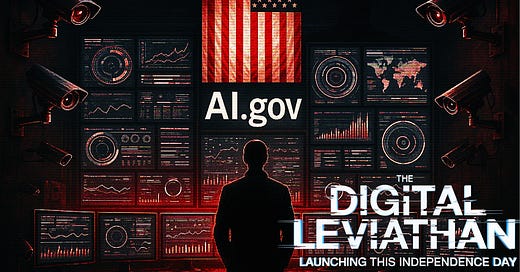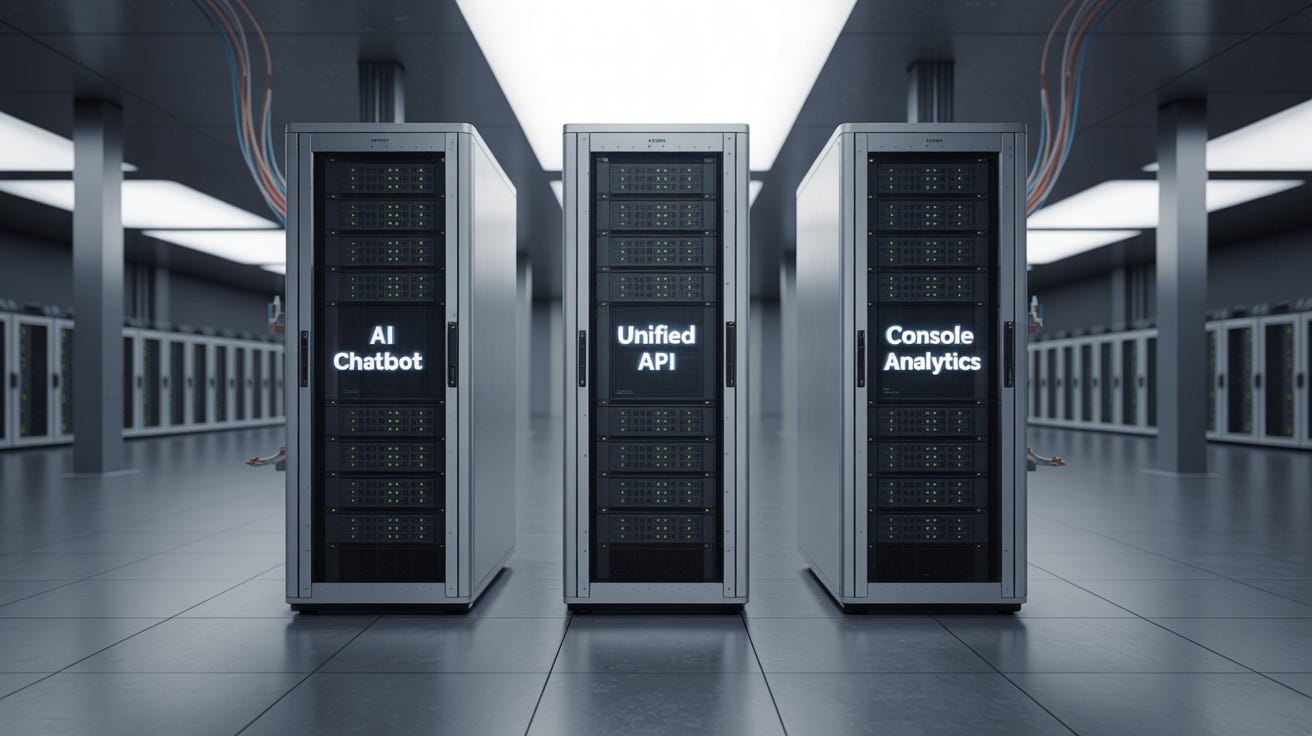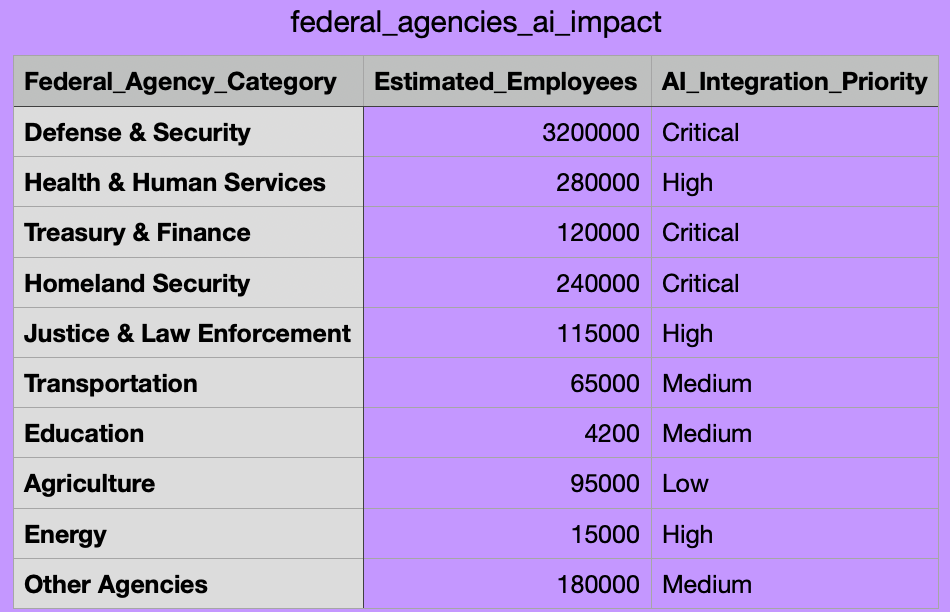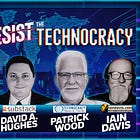AI.gov: The Digital Leviathan Launching This Independence Day
How America's Technocratic Elite Are Replacing Democracy with Algorithmic Control
The Silent Coup in Plain Sight
Beautiful souls, we stand at the precipice of the most dangerous transformation in American governance since the founding of our republic. While you’ve been distracted by the theater of partisan politics, a far more sinister revolution has been quietly orchestrating itself in the shadows of Silicon Valley boardrooms and federal bureaucracies.
On July 4, 2025—in just sixteen days—the Trump administration will launch AI.gov, a centralized artificial intelligence command center that represents nothing less than the digitization of tyranny. This isn’t hyperbole or conspiracy theory. This is documented fact, leaked from government repositories and confirmed by multiple sources. What you’re about to learn will fundamentally change how you understand the battle for human agency in the 21st century.
The Leaked Blueprint for Algorithmic Authoritarianism
The veil of secrecy surrounding AI.gov was torn away when researchers at 404 Media discovered a publicly accessible GitHub repository containing the project’s complete blueprint. Before government officials could slam the digital door shut, the entire architecture of America’s technocratic future had been exposed to public scrutiny.
AI.gov isn’t simply another government website—it’s a unified platform designed to give federal agencies unprecedented power to monitor, analyze, and control every aspect of digital life within government operations, with the infrastructure already in place to extend far beyond. The platform consists of three primary components that together form what I call the “Trinity of Technocratic Control”:
1. The AI Chatbot Assistant
Positioned as a helpful tool for “streamlining research, problem-solving, and strategy guidance,” this chatbot is designed to replace human judgment with algorithmic determination. By removing the “messy unpredictability” of human decision-making, it creates a veneer of efficiency while eroding the democratic process.
2. The Unified API Framework
This system promises to connect all government systems to AI models from major providers including OpenAI, Google, Anthropic, Amazon, and Meta. The centralization creates a single point of control over how artificial intelligence interfaces with every branch of federal government—from defense to healthcare to law enforcement.
3. CONSOLE: The Panopticon Dashboard
The most chilling component, CONSOLE, provides real-time monitoring of AI usage across government agencies. It tracks which tools federal employees use, analyzes their performance, and enables managers to “optimize resource allocation.” In plain English: comprehensive workplace surveillance disguised as management analytics.
The Technocratic Vanguard: Meet Your New Overlords

Every revolution has its architects, and the AI.gov initiative is no exception. Leading this charge is Thomas Shedd, a former Tesla software integration engineering manager appointed to head the General Services Administration’s Technology Transformation Services (TTS) in January 2025. Shedd’s appointment represents more than a personnel change—it signals a fundamental shift in how our government conceives of its relationship with citizens.
Described as an ally of Elon Musk, Shedd has outlined an “AI-first strategy” for government operations, with the explicit goal of transforming the GSA to operate “like a software startup”. This language isn’t accidental. It reveals the technocratic mindset that views governance as an engineering problem to be optimized rather than a democratic process requiring human deliberation and consent.
Under Shedd’s leadership, TTS has already undergone 50% workforce reductions. This isn’t mere cost-cutting—it’s the systematic replacement of human workers with algorithmic systems, creating the conditions for what technocrats euphemistically call “efficiency gains” but which more accurately represents the elimination of human agency from government operations.
The Infrastructure of Digital Tyranny
To understand the true scope of AI.gov’s potential impact, we must examine the technical infrastructure being deployed. The platform is built primarily on FedRAMP-certified systems, with most AI models served through Amazon Bedrock. While this certification process ostensibly ensures security, it also creates a controlled environment where only approved AI systems can operate within government networks.
However, leaked documentation reveals concerning gaps. The inclusion of models from Cohere—a company without FedRAMP certification—suggests security protocols are being overridden to prioritize rapid deployment. This recklessness exposes sensitive government data to unprecedented risks, all in service of accelerating the technocratic agenda.
The scale of federal employees potentially subject to AI.gov’s monitoring capabilities is staggering:
The Philosophical War: Technocracy vs. Constitutional Republic
To grasp why AI.gov represents an existential threat, we must confront the fundamental divide between technocracy and our constitutional republic. This isn’t merely a policy disagreement—it’s a war between two incompatible visions of human organization.
Basis of Authority:
Technocracy: Authority rests with experts—scientists, engineers, and technocrats—who are selected based on specialized knowledge and technical expertise. Governance prioritizes efficiency and data-driven solutions over democratic input.
Constitutional Republic: Authority derives from the people, who elect representatives to govern within a framework of laws defined by a constitution. Power is distributed through checks and balances, emphasizing individual rights and public consent.
Decision-Making Process:
Technocracy: Decisions are made by unelected experts who use scientific methods and data to optimize systems, often sidelining public opinion or political debate. Smart contracts and AI could eliminate debate entirely.
Constitutional Republic: Decisions are made through elected officials and legislative processes, guided by constitutional principles and public input. Debate, compromise, and voter accountability are central.
Role of the Individual:
Technocracy: Individual rights and freedoms may be subordinated to collective goals or system efficiency. Citizens are often seen as components of a managed system rather than sovereign actors.
Constitutional Republic: Individual rights are paramount, protected by the constitution. Citizens have a direct role in governance through voting and civic participation, with safeguards against tyranny of the majority or elite control.
Accountability:
Technocracy: Experts are not directly accountable to the public, as their legitimacy comes from expertise, not elections. This can lead to a disconnect between rulers and the governed.
Constitutional Republic: Elected officials are accountable to voters through regular elections, and the judiciary ensures adherence to constitutional limits. Power is constrained by transparency and public oversight.
Governance Philosophy:
Technocracy: Emphasizes a top-down, utilitarian approach where societal problems are treated as technical challenges to be solved by optimizing resources and systems, often ignoring cultural, moral, or ideological considerations.
Constitutional Republic: Prioritizes a bottom-up approach, balancing competing interests and values through deliberation and adherence to a fixed set of principles, ensuring stability and protection of liberties.
In essence, technocracy seeks to replace political choice with technical management, undermining the democratic foundations of a constitutional republic, which prioritizes the will of the people and the rule of law over expert control. A technocracy could theoretically exist within a republic, but it would erode the constitutional framework by concentrating power in an unelected elite, directly opposing the republic’s commitment to distributed power and citizen sovereignty.
Technocrat magazine 1937, explicitly state that technocracy is “the science of social engineering”.
Technocracy is the science of social engineering, the scientific oper-
ation of the entire social mechanism to produce and distribute goods and
services to the entire population of this continent. For the first time in
human history it will be done as a scientific, technical engineering problem.
There will be no place for Politics or Politicians, Finance or Financeers,
Rackets or Racketeers.
Technocracy states that this method of operating the social mech-
anism of the North American Continent is now mandatory because we have
passed from a state of actual scarcity into the present status of potential
abundance in which we are now held to an artificial scarcity forced upon
us in order to continue a Price System which can distribute goods only by
means of a medium of exchange. Technocracy states that price and
abundance are incompatible; the greater the abundance the smaller the
price. In a real abundance there can be no price at all. Only by abandon-
ing the interfering price control and substituting a scientific method of
production and distribution can an abundance be achieved. Technocracy
will distribute by means of a certificate of distribution available to every
citizen from birth to death.
The Technate will encompass the entire American Continent from
Panama to the North Pole because the natural resources and the natural
boundaries of this area make it an independent, self-sustaining geographi-
cal unit. Technocracy's blue -prints have been designed for this continent
and for no other. It is an American Plan for the American continent, No
imported political philosophies including Democracy are in any way ap-
plicable. Technocracy’s Cold Calculus
Technocracy views governance as an engineering problem requiring solutions from credentialed experts. It promises efficiency and “data-driven decisions” but eliminates citizen agency from the governing process. As Patrick Wood, author of Technocracy: The Hard Road to World Order, warns:
“Technocracy removes political structure and citizen involvement. It hands control to a scientific dictatorship.”
The Assault on Cognitive Liberty
As someone who has dedicated her life to defending cognitive liberty—the right to mental self-determination—I recognize AI.gov as the most sophisticated threat to human consciousness ever devised.
The CONSOLE Effect
When individuals know they’re being monitored, they engage in self-censorship, conforming their thoughts and behaviors to avoid algorithmic detection. This psychological phenomenon, well-documented in corporate surveillance systems, will now infect the entire federal workforce.
Shoshana Zuboff, in The Age of Surveillance Capitalism, describes how constant data harvesting alters human consciousness. We become “behavioral futures markets”—sources of data to be mined for algorithmic control. AI.gov institutionalizes this dystopia at the federal level.
Global Context: Digital Authoritarianism Goes Mainstream
The AI.gov threat mirrors global trends:
56 countries now use AI surveillance, with government contracts surging to $95M in 2024
China’s social credit system and the EU’s proposed AI Act reveal a disturbing convergence between authoritarian and democratic states. Even the Department of Homeland Security now monitors “soft targets” like shopping malls using AI surveillance.
The Path Forward: Reclaiming Human Agency
We stand at a crossroads. The choice isn’t between efficiency and inefficiency—it’s between human agency and algorithmic control, the Constitutional Republic vs algocracy.
Demands for Resistance
Transparency: Every AI.gov algorithm must be open to public inspection.
Human Review: All AI decisions require human oversight and appeal processes.
Cognitive Liberty Zones: Federal employees deserve surveillance-free communication channels.
The Final Countdown
AI.gov launches in sixteen days. Once operational, its infrastructure will make resistance exponentially harder. The window for action is closing rapidly.
Conclusion: Independence Day or Algorithmic Enslavement?
This July 4th, we’re not celebrating freedom—we’re witnessing its potential demise. The technocrats bet we’ll choose convenience over liberty, efficiency over agency.
But I know better. I’ve seen the resilience of the human spirit! My own personal story of being born with congenital disabilities that led to a prognosis claiming there was no hope for my life, to building movements that challenge power. Your “messy, imperfect, foible filled, gloriously human judgment” is infinitely more valuable than any AI system.
Let’s preserve cognitive liberty, national and personal sovereignty and the free-will of humanity! Share this article. Demand accountability. Resist technocracy!!
What will you choose?

Subscribe to Courtenay’s Substack for exclusive deep dives into technocracy, cognitive liberty, and the future of human agency.
Bibliography
Government and Official Documents
The White House. "Artificial Intelligence for the American People."
Trump White House Archives.
Overview of federal AI initiatives and policy under the Trump administration.White House Office of Management and Budget. "White House Releases New Policies on Federal Agency AI Use and Procurement."
WhiteHouse.gov, April 7, 2025.
Details on revised federal AI adoption and procurement policies.
News and Analysis
Complete AI Training. "US government to launch AI chatbot platform AI.gov led by former Tesla engineer on July 4."
June 12, 2025.
Background on AI.gov platform, leadership, and objectives.EVOTEK. "Trump's AI Initiative: Source Code Leaked On GitHub."
June 16, 2025.
Details on leaked GitHub repository, platform components, and security concerns.The Register. "Trump team leaks AI plans in public GitHub repository."
June 10, 2025.
Discussion of AI.gov’s development, leadership, and implications.
Academic and Scholarly Sources
SSRN. "AI governance: Compromising democracy or democratising AI?"
August 1, 2024.
Comparative analysis of AI governance frameworks and their democratic implications.First Amendment Law Review. "Cognitive Liberty and The First Amendment as a Weapon in the Fight Against Technological Intrusions of the Mind."
April 1, 2024.
Exploration of cognitive liberty and legal protections in the digital age.Optery. "An In-Depth Look at Shoshana Zuboff's Theories on Surveillance Capitalism."
March 15, 2025.
Summary and critique of Zuboff’s theories on surveillance capitalism.
Recommended Further Reading
Zuboff, Shoshana. The Age of Surveillance Capitalism: The Fight for a Human Future at the New Frontier of Power. PublicAffairs, 2019.
Seminal work on surveillance capitalism and its societal impact.Wood, Patrick M. Technocracy: The Hard Road to World Order. Coherent Publishing, 2018.
Critical analysis of technocracy and its influence on global governance.Pasquale, Frank. The Black Box Society: The Secret Algorithms That Control Money and Information. Harvard University Press, 2015.
Examination of algorithmic decision-making and its consequences for democracy.



















Book title: "The Advent of the Algorithm"
subtitle: "The 300-year journey from an idea to the computer"
Author: David Berlinski
https://www.amazon.com/dp/0156013916/
This is a popular book published in the Spring of 2001.
Berlinksi is a philosopher, disciple and friend of philosopher and MD Marcel-Paul Schützenberger. Both were involved in the fundamental combinatorial critique of Darwinism and evolutionary theory in general. Both thinkers seem to be ambiguous but leaning against eugenics, social engineering, the myth of the new man, and so forth. Also, they ambiguously lean to favor the idea of a Creator God.
Berlinski always writes in a semi-salacious way, quite appealing to the reader. Many popular, polemical books under his belt. This book contains some humorous anecdotes about the of lives of inventors and thinkers who invented computers.
The preface is titled "The digital bureaucrat." An excerpt: "If a bureaucracy resembles a computer at the level of social organization, the living cell, if it resembles anything in our experience, resembles a computer at the level of molecular organization. The metaphor is irresistible and few biologists have resisted it. And for good reason. No other metaphor conveys the intricacies of cellular replication, transcription, and translation; and, for all that we can tell, nothing besides an algorithm can handle the administration of the biological molecules.
These reflections might indicate that the digital computer represents less of a bright, bursting novelty in human experience than is generally imagined. Although true, this is, of course, a conclusion too reassuring to be completely true. There is a considerable difference between the execution of an algorithm by a social bureaucracy or even a bacterial cell and the execution of an algorithm by a digital computer. Having coaxed the concept of an algorithm into self-consciousness, the logicians have made possible the creation of algorithms of matchless power, elegance, concision, and reliability. A digital computer may well do what a bureaucracy has done, but it does it with astonishing speed, the digital computer possessing an altogether remarkable ability to compress the otherwise sluggish stream of time. This has made all the difference in the world."
He ends the preface later with this statement: "For all the great dreams profitlessly invested in the digital computer, it is nonetheless true that not since the framers of the American Constitution took seriously the idea that all men are created equal has an idea so transformed the material conditions of life, the expectations of the race."
He refers to the idea of the algorithm.
--
In chapter 9 "The imaginary machine" he mentions once the syntagma "artificial intelligence" and in chapter 12 "An artifact of the mind" he explains it further the impossibility of such thing. He argues for a "reformation" of quantum physics to include that result. Hilarious!
--
Here's a comment of mine. I see the problem introduced by Descartes (or whoever those people may have been in reality) of the mechanization of the bodies of animals, the view of them only as machines, has its counterpart in the more recent biologization of electronic devices, which, by the same sophistry, have been assigned a quality they don't really have. We are not being fooled by a demon who tells us that the external world is real but in reality only us exist, and we are not brains in vats, as Putnam put it, but also microchips are not experiencing hallucinations, and the photosensors in digital cameras are not sensing anything, and the processor that treats the data they capture are also not executing any biological algorithm.
It's all just abuse of language. And nothing more than than dark marketing arts applied to the fomenting of mass mental illness among the hoi polloi, with the purpose of making them weaker and easier to rob from.
Twenty five years after Berlinski wrote this book, and having lived mostly connected to the internet, reading a lot, hearing many opinions and looking at many funny kitten pictures, I have to manifest my adverse conclusion that an electronics-run world government would not be any more biological than a human-run world government. It's just the same nonsense as always, only faster and cornier.
What humans do normally to each other is not a projection of what an organism does to itself, to keep alive and reproduce. A result that contradicts the ideological ambitions of most scientists. Human beings, politically, seek to either exterminate one another, or to cooperate with one another for mutual benefit. The distinction of the political means from the economic means is still the best result of sociological research, in my opinion. Faster computers imply that extermination and cooperation will be faster and more expensive, because human corruption and greed is almost infinite.
Also, human boredom will become greater and more dangerous, and time will melt ever more sluggishly. What is coming is far worse than Bolshevism and Naziism: there will be an artificial dualism of mind and body with the split of consciousness between the province of automatic government and the province of autonomous thought. A total separation from actions and consequences, that, when the dust settles, will not look fun to anyone, if there is anyone left to judge the past.
That's why I recommend everyone the memorization of all Psalms written by the other David, in Aramaic, Latin, Greek and German language, to have all our bases covered with the four pure races, the true masters of this world.